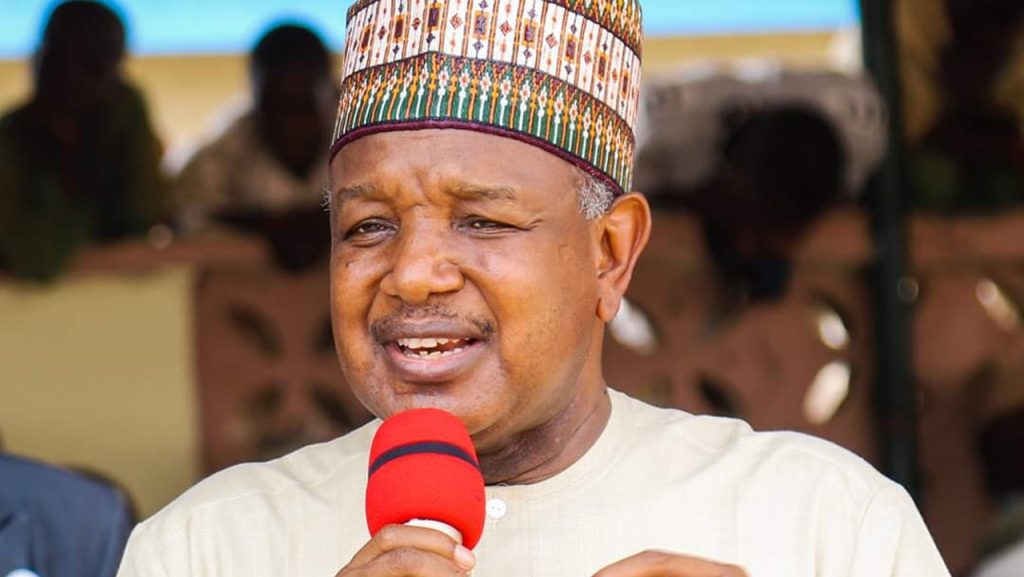
Atiku Bagudu
Tinubu’s minister previously under U.S investigation for money laundering – Report
President Bola Tinubu appointed Atiku Bagudu, who the United States has accused of helping a former dictator loot the country of billions of dollars in the 1990s, as his budget minister.

Bagudu hasn’t been convicted of any crime but in an ongoing forfeiture lawsuit before a federal judge in Washington, the US Justice Department alleges he was part of a group headed by former military ruler Sani Abacha that “embezzled, misappropriated and extorted billions from the government of Nigeria.” The former governor and senator was sworn in on Monday as minister of budget and economic planning.

The US allegations have not been proven and ignore the longstanding resolution of all disputes between the politician and the Nigerian state, according to Bagudu’s legal representative.
The newly installed ministers “have been carefully selected by me for their track records of excellence and achievement in public and private sectors,” Tinubu said in the capital, Abuja, after his cabinet took theirs oaths of office.
Bagudu, 61, will play an influential role in managing an economy that was the largest on the continent at almost $480 billion before a recent devaluation of the currency and 21.8 trillion naira ($28 billion) in annual government spending. Tinubu took office in May.
The “unproven” allegations reflect “solely the position advanced” by the Justice Department and the US government’s account omits events including Bagudu’s “immediate and effective assistance in the recovery of funds following the death of General Abacha,” PCB Byrne, a London-based law firm representing Bagudu, said in an email.
Bagudu voluntarily repatriated more than $650 million to Nigeria in 1998, several months after Abacha died, according to US court filings.
He reached a settlement with the Nigerian government in 2003 in which he didn’t admit to any wrongdoing and the authorities dropped outstanding civil and criminal claims against him in exchange for the return of an additional $163 million. The politician’s brother Ibrahim — who is entitled to an annuity from assets the US wants to confiscate — is challenging the forfeiture complaint.
“Bagudu played an instrumental role in setting up and executing the complicated financial transactions used to launder the proceeds of the conspiracy” that took place under Abacha, the Justice Department alleged in a 2013 complaint filed at the District Court for the District of Columbia.
The US has spent the last decade trying to seize investment portfolios that were worth 141 million euros ($153 million) in late 2019 and are held in trust for Bagudu’s family. Bagudu is currently involved in negotiations with the Justice Department over a potential settlement to the court case.
These talks also include the Nigerian government, which has argued that the 20-year-old agreement with Bagudu prevents it from helping the US seize the assets. Instead, the administration of Tinubu’s immediate predecessor, Muhammadu Buhari, signed a revised settlement in 2018 that would see ownership of the portfolios transferred to the Nigerian state, which in turn would return about 70% of the disputed funds to Bagudu.
While the US “claims that it is pursuing this action for the benefit of Nigeria, it well knows that Nigeria long ago relinquished any rights it might have had” to the assets, Bagudu’s brother and other family members said in a court filing asserting their rights to the targeted funds. The US failed to “allege that any person knowingly engaged in money laundering” and to “sufficiently trace the proceeds of the alleged criminal activity,” they said.
The US asked Buhari’s government in early 2020 to withdraw litigation that “hinders the US effort to recover” money it alleges was misappropriated and laundered by Bagudu. “Nigeria’s decision to enter into the settlement agreement should not bind the United States,” the Justice Department has told the court in Washington.
The US State Department is “aware of the appointments announced by President Tinubu” and is “assessing the implications” of Bagudu’s nomination, a spokesperson said by email. The US Justice Department declined to comment.
Bagudu has never been convicted of any offense in any jurisdiction, according to PCB Byrne. He has “met his obligations” under the 2003 agreement and “contributed very significantly to Nigerian society over the subsequent 20 years,” the law firm said.
Tinubu’s spokesman did not reply to a request for comment.
Report by Bloomberg, with assistance by Anthony Osae-Brown



